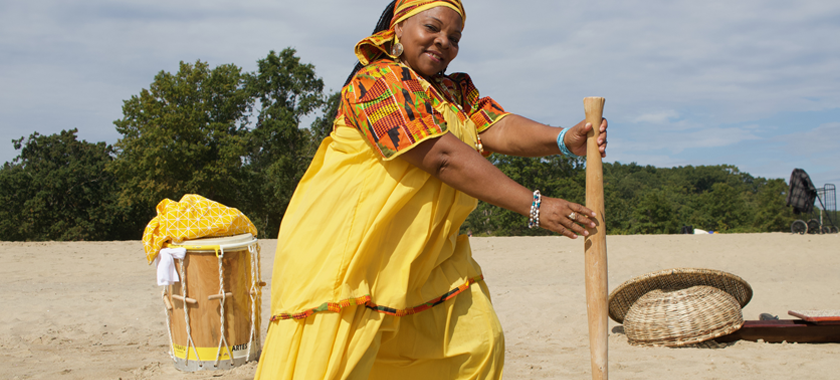
Conversations | Luz Soliz-Ramos and Catherine Ochún Soliz-Rey
The mother-daugher duo speak about their work to preserve and celebrate Garifuna culture through programming and dance.
Artistic practices grounded in tradition and heritage represent a crucial piece of art historical conversation. Mother-daughter duo Luz Soliz-Ramos and Catherine Ochún Soliz-Rey spoke with us about their work to preserve and celebrate Garifuna culture through programming and dance with the Wabafu Garifuna Dance Theater. Soliz-Ramos and Soliz-Rey were jointly awarded a 2021 NYSCA/NYFA Artist Fellowship in Folk/Traditional Arts, the first external recognition of their cultural work and ideas. For those who are unfamiliar, the Garifuna are an Afro-Indigenous people originally from the Caribbean island of St. Vincent who are now primarily located in Central America.
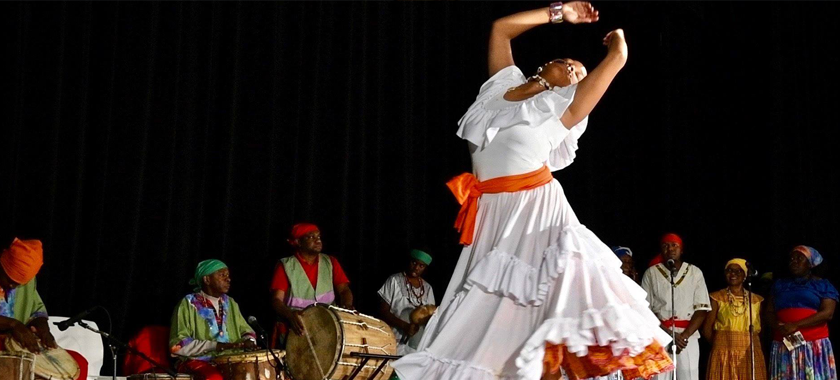
NYFA: Luz, tell us a bit about your journey of immigrating to the U.S. from Honduras and becoming a working artist and cultural worker in New York City.
Luz Soliz-Ramos: I came to the United States at an early age of 15. I had the opportunity to attend high school here in the United States. From there, I went to study in upstate New York. First to Marist College, where I had the opportunity to study Spanish literature, and later I transferred to Bard College, where I studied dance and drama.
I always knew that I wanted to be an artist. I didn’t know how I would do it, but I wanted to be in the arts. After discovering modern dance, ballet, African dancing, jazz dancing, tap dancing, and all the American dancers that I enjoyed, I realized that it was time to pay more attention to the dances of my culture—the Garifuna culture.
In the late 1980s, when I was teaching dance in the public schools in the Bronx, I was also attending graduate school and had to do my masters thesis for dance education from Teachers College, Columbia University. I decided that I would do it on Garifuna dance. I didn’t realize that there was not enough information on this subject. I then decided that I would organize a dance company here in New York. I formed Hamalali Wayunagu (Voices of our Ancestors) Dance Company, which we renamed to Wabafu (Our Power) Garifuna Dance Theater in 2017. It is one of the longest-running dance companies in the Tri-State area. When I worked in public schooling, I enjoyed working with children because I realized that they are our future generation. I believe that we should always dedicate more time in educating young people about dance; the earlier, the better.
I believe that we should always dedicate more time in educating young people about dance; the earlier, the better.
-Luz Soliz-Ramos
As a Garifuna artist, it was very important that I made the decision to engage the youngsters and adults in becoming part of the dance company. I saw a need to share our culture with people who didn’t know anything about it. I must say that it has been a successful experience. We started in 1992 and we are still going strong. I am happy to see many students evolving from the journey. What keeps us going is strength, pride, and love for our culture.
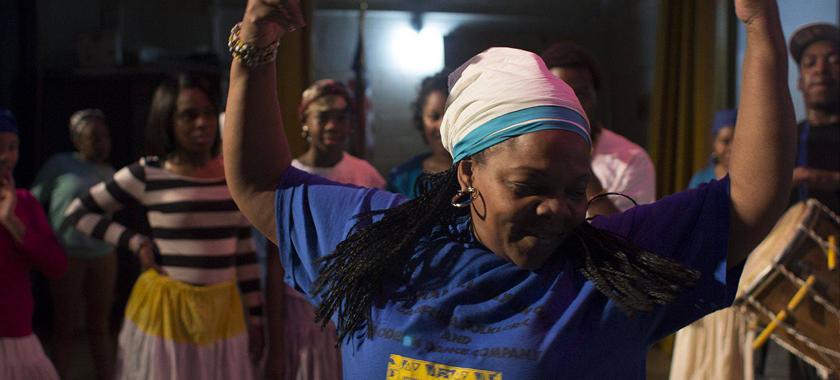
NYFA: Catherine, what have you learned from collaborating with your mother on this work?
Catherine Ochún Soliz-Rey: I’ve learned to appreciate my culture on a deeper level. I’ve learned how rich and unique it is to be Garifuna and through the arts I’ve been able to find an engaging approach for cultural preservation. The arts are a perfect medium for a lot of different work, and as a creative, I’ve come to see how I can leverage it to do many things; to not just entertain, but also to educate and inspire.
The arts are a perfect medium for a lot of different work, and as a creative, I’ve come to see how I can leverage it to do many things; to not just entertain, but also to educate and inspire.
–Catherine Ochún Soliz-Rey
Your leadership is also an area that no doubt strengthens when you lead a group and organize projects. The art world has many colorful personalities, so I’ve also learned to work with all kinds of people. Sometimes it’s almost like you’re forced to become part psychologist! However, I would not change it for anything. I’ve learned so much about compassion, perspective, and patience.
My mother has set in place impactful strategies that have allowed her to maintain the roots of the Garifuna tradition in such an evolving, urban environment like New York City. I also find myself constantly finding ways to bring my modern perspective on the world to innovate how we display and share our culture. Her mindset and methods have served as my foundation, and as a result I’ve learned engaging ways to protect the Garifuna culture.
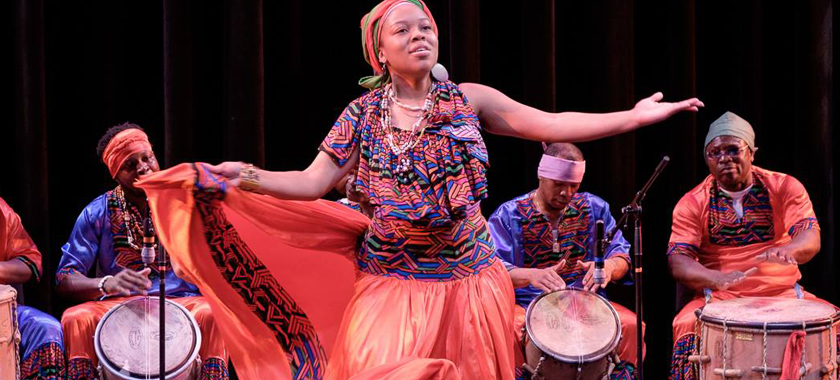
NYFA: What are some of the upcoming plans you have for Wabafu Garifuna Dance Theater or any other projects in the realm of this work?
COSR: Wabafu Garifuna Dance Theater has learned a lot through the pandemic—from virtual performances to virtual practices and singing through a mask. It’s been a challenge, but has no doubt made us more equipped for expansion and innovative ideas. We are strategizing how to move forward with rehearsals so we stay in accordance with new regulations in these times of COVID-19. We are diversifying the types of art forms and platforms through which we share the culture.
In addition to performances we will work with our mother entity, the not-for-profit Garifuna Heritage Center for the Arts and Culture, to create more educational workshops. Why? We have realized the urgent importance of passing down the intricacies of the tradition. There are also more Garifuna exhibits, such as one we recently did at Boricua College, and other cool experiences planned. Wabafu will also get back to performing at live and in-person and sharing more digital content to keep leveraging the virtual experience—one that we realized is so powerful through COVID.
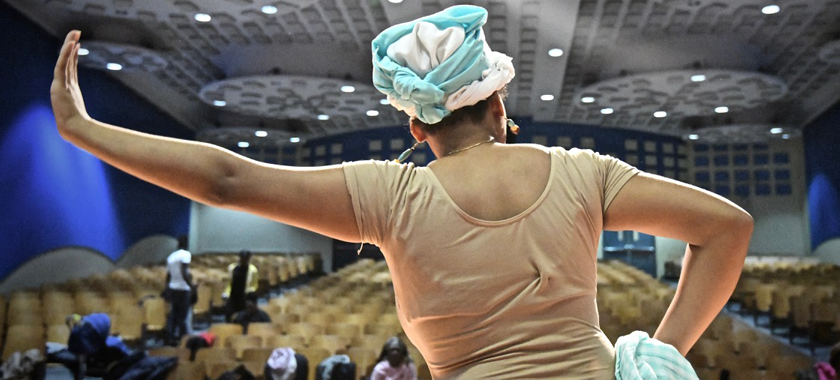
NYFA: What advice would you offer other immigrant artists trying to preserve a traditional art form in a new country?
LSR: My advice to future generations whose intention is to share their culture through the arts is to employ love, patience, and dedication to the work. It is very important to understand and appreciate the common factors in humanity. Teach your culture and appreciate the cultures of others, as well. It’s important to know your culture well in order to appreciate the elements in the culture of others. Educating yourself in your area is important. There will be many new influences compared to what you see back home. This is why it’s key to expand from a strong foundation of knowledge and understanding. As an immigrant, you have great opportunities in this country if you have patience and position yourself. Be clear in your goals and objectives, have faith, and be willing to work for your dream.
My advice to future generations whose intention is to share their culture through the arts is to employ love, patience, and dedication to the work.
–Luz Soliz-Ramos
About Catherine Ochún Soliz-Rey:
Catherine Ochún Soliz-Rey is assistant director of Wabafu Garifuna Dance Theater. When she is not fulfilling her mission as a women empowerment thought leader in her business, she is choreographing and dancing for the dance company as well as creatively directing educational cultural events and experiences. Soliz-Rey has a wide background in dance, having learned with Lee Aca Thompson, Forces of Nature Dance Academy, Creative Outlet Dance Intensive, and of course her mother, Luz Soliz-Ramos. Born and raised in the Bronx, NY, Soliz-Rey has made the extra effort to stay sharp in her culture and pass on that passion to others. Soliz-Rey has a B.S. degree in Marketing from St. John’s University and infuses her knowledge for business and the arts to further awareness of the culture.
About Luz Soliz-Ramos:
Luz Soliz-Ramos is the founder of the Bronx-based Garifuna Heritage Center for the Arts and Culture and Co-Choreographer & Artistic Director of the Wabafu Garifuna Dance Theater, which was established as the Hamalali Wayunagu Garifuna Dance Company in 1992. She was inspired by her teachers, including Lee Aca Thompson and Lavinia WilliamsYarborough, and her friend, Manuela Sabio, founder of the Wanichigu Garifuna Dance Company. Soliz-Ramos studied dance and drama at Bard College and now teaches at Boricua College. She has also taught for over a decade in New York City public schools. She holds a Master’s degree from Teachers College, Columbia University. She is also the author of a language book, Learn Garifuna Now! For information on Wabafu Garifuna Dance Theater, visit: facebook.com/wabafudance.
– Interview conducted by Kyle Lopez, Program Associate and Editor, Con Edison Immigrant Artist Program Newsletter
This post is part of the ConEdison Immigrant Artist Program Newsletter #143. Subscribe to this free monthly e-mail for artist’s features, opportunities, and events. Learn more about NYFA Immigrant Artist Mentoring Program.